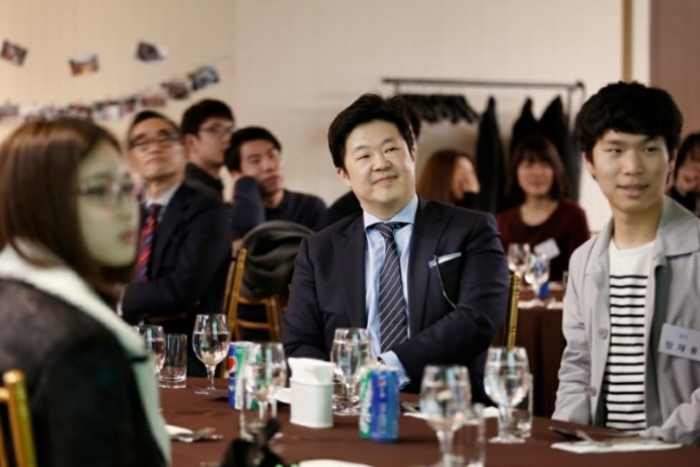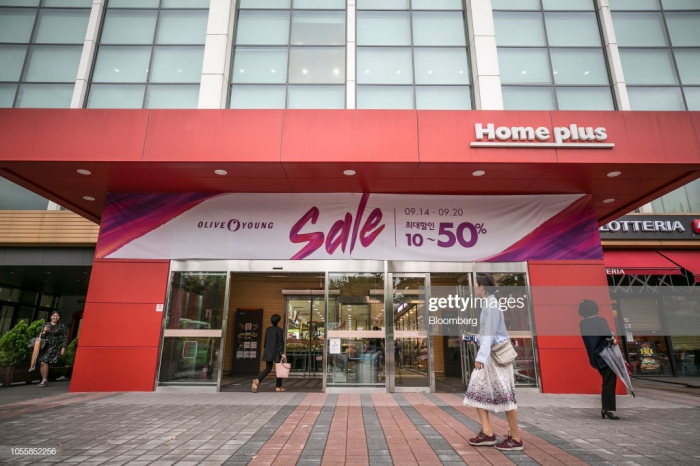MBK sees better exit landscape in 2025, bets on governance reform
'There is no greater challenge and opportunity facing us than AI adoption,' says its chairman
By Apr 03, 2025 (Gmt+09:00)
LG Chem to sell water filter business to Glenwood PE for $692 million


KT&G eyes overseas M&A after rejecting activist fund's offer


Kyobo Life poised to buy Japan’s SBI Group-owned savings bank


StockX in merger talks with Naver’s online reseller Kream


Meritz backs half of ex-manager’s $210 mn hedge fund



MBK Partners sees a recovery in the exit environment in 2025 and seeks to capitalize on the opportunities emerging from corporate governance reform to deliver higher returns than in previous years, said Michael ByungJu Kim, founder and chairman of the North Asia-focused investment firm.
In 2024, private equity firms struggled to divest as a stock market rally lured investors away from private markets, while a slowing economy dampened corporate appetite for M&As.
Globally, funds raised for private equity firms fell by 23% last year and the exit value of their portfolio assets decreased by 14%, according to MBK.
“There are growing opportunities for monetizing our portfolios. Exits are not easy, especially in the still-chilly IPO environment. But we see an uptick in corporate buyer and GP activity, especially in our region,” Kim said in his annual letter to limited partners.
GP refers to general partners, who manage assets for limited partners such as pension funds, insurance companies and endowments.
The total fair market value of MBK’s active investments stands at $20.0 billion, “a meaningful portion of which we will seek to monetize this year,” he added.
It manages over $31 billion in capital in two strategies: buyouts and special situations.

CORPORATE GOVERNANCE
With over $5.5 billion in dry powder, Kim bets on corporate governance reform and government-led initiatives aimed at enhancing shareholder value in Korea and Japan, followed by AI transformation.
Korean companies remain undervalued largely due to perceived poor corporate governance by certain families of chaebol, or family-controlled conglomerates, the chairman said. He cited Korea Zinc Inc. as an example of a company with a room to improve enterprise value through governance reform.
It is seeking to jointly acquire control of the world’s largest lead and zinc smelter alongside the latter’s largest shareholder Young Poong Corp. It has poured $546.2 million of equity into Korea Zinc.
“What is frequently overlooked is that the transaction is about governance reform. Improved governance through professional management and a shareholder-focused board will unlock the full value potential of this world-class company,” Kim added.
“We believe this is a watershed transaction that will usher in a new wave of governance-focused deal activity, Kim said, adding MBK is acting as a “white knight” to Young Poong.
DEMOGRAPHIC SHIFTS
The buyout firm is looking to tap into demographic shifts, such as a rapidly aging population and the growing participation of women in the workforce, with a focus on the consumer and retail sectors, as well as healthcare.
“These trends enable scaling our core sectors like healthcare, especially elderly care and consumer/retail,” Kim said in the letter.

HOMEPLUS
Homeplus, one of its oldest and largest investments, is a weak spot in MBK's portfolio. In March, the retailer filed for rehabilitation proceedings due to liquidity constraints following credit rating downgrades.
In response, MBK has pledged to take “societal responsibility,” including through personal contributions to support stakeholders.
CAPITAL DEPLOYMENT
Last year, it raised around $5 billion for its sixth buyout fund at its second close.
The same year, the private equity house deployed $3.6 billion in capital, including co-investment for eight new investments, mostly in Japan and Korea. In 2024, it returned $1.2 billion to LPs, mostly through partial sales and leveraged recapitalizations.
Its Korean deals in 2024 included the acquisition of Geo-young, the leading pharmaceutical distributor in Korea, for $697.8 million in equity and recapitalization for Golfzon County and Lotte Card Co.
In Japan, MBK invested $336.2 million to acquire Hitowa, a leading living support service provider, and $703.7 million to acquire Alinamin, an iconic OTC drug maker, in 2024. Early this year, it invested $255.2 million to acquire FICT, a leading PCB manufacturer.
In China, however, it has not executed new buyout deals for nearly three years. “We see special situations opportunities as more attractive on a risk-return basis (in China),” Kim added.

ARTIFICIAL INTELLIGENCE
MBK views generative AI as both a challenge and an opportunity, not only for investments but also for portfolio company management.
It began incorporating AI into its investment process from initial deal screenings to due diligence and real-time performance monitoring of portfolio companies.
"In my annual letter four years ago, I announced 'Every deal is a tech deal.' I now preach to our employees, 'Every business is an AI business.' There is no greater challenge and opportunity facing us than AI adoption.”
Write to Yeonhee Kim at yhkim@hankyung.com
Jennifer Nicholson-Breen edited this article.
-
 Private equityMBK Special Situations relinquishes Korean investment advisory license
Private equityMBK Special Situations relinquishes Korean investment advisory licenseMar 21, 2025 (Gmt+09:00)
2 Min read -
 Pension fundsKorea’s pension fund NPS rules out investing in MBK’s hostile M&A deals
Pension fundsKorea’s pension fund NPS rules out investing in MBK’s hostile M&A dealsMar 18, 2025 (Gmt+09:00)
1 Min read -
 Debt financingMBK chairman to leverage own funds to pay Homeplus suppliers
Debt financingMBK chairman to leverage own funds to pay Homeplus suppliersMar 17, 2025 (Gmt+09:00)
3 Min read -
 Mergers & AcquisitionsMBK's fight for Korea Zinc control drags on after court ruling
Mergers & AcquisitionsMBK's fight for Korea Zinc control drags on after court rulingMar 07, 2025 (Gmt+09:00)
2 Min read -
 Mergers & AcquisitionsMBK Partners poised to acquire CJ Cheiljedang’s $3.5 billion bio business
Mergers & AcquisitionsMBK Partners poised to acquire CJ Cheiljedang’s $3.5 billion bio businessMar 06, 2025 (Gmt+09:00)
3 Min read -
 Private equityMBK-owned Homeplus files for corporate revamp with Seoul court
Private equityMBK-owned Homeplus files for corporate revamp with Seoul courtMar 04, 2025 (Gmt+09:00)
4 Min read -
 Mergers & AcquisitionsMBK-led consortium to take over Japan’s FICT for $656 mn
Mergers & AcquisitionsMBK-led consortium to take over Japan’s FICT for $656 mnFeb 06, 2025 (Gmt+09:00)
2 Min read -
 Investment bankingMBK’s ByungJu Kim, UBS’ Kyungin Lee: Most influential in capital market
Investment bankingMBK’s ByungJu Kim, UBS’ Kyungin Lee: Most influential in capital marketJan 20, 2025 (Gmt+09:00)
4 Min read -
 Mergers & AcquisitionsMBK kicks off Lotte Card sale for about $1.4 bn in 2nd bid
Mergers & AcquisitionsMBK kicks off Lotte Card sale for about $1.4 bn in 2nd bidDec 02, 2024 (Gmt+09:00)
4 Min read -
 Private equityMBK Partners’ 6th buyout fund raises $5 bn at 2nd close
Private equityMBK Partners’ 6th buyout fund raises $5 bn at 2nd closeNov 19, 2024 (Gmt+09:00)
1 Min read -
 Mergers & AcquisitionsMBK’s Korea Zinc bid aimed at corporate governance, shareholder value
Mergers & AcquisitionsMBK’s Korea Zinc bid aimed at corporate governance, shareholder valueNov 05, 2024 (Gmt+09:00)
2 Min read -
 Leadership & ManagementMBK, Young Poong seek $1.5 bn hostile bid for Korea Zinc
Leadership & ManagementMBK, Young Poong seek $1.5 bn hostile bid for Korea ZincSep 13, 2024 (Gmt+09:00)
4 Min read -
 AirlinesMBK drops out of Air Premia’s Asiana cargo unit takeover bid
AirlinesMBK drops out of Air Premia’s Asiana cargo unit takeover bidJun 12, 2024 (Gmt+09:00)
2 Min read


